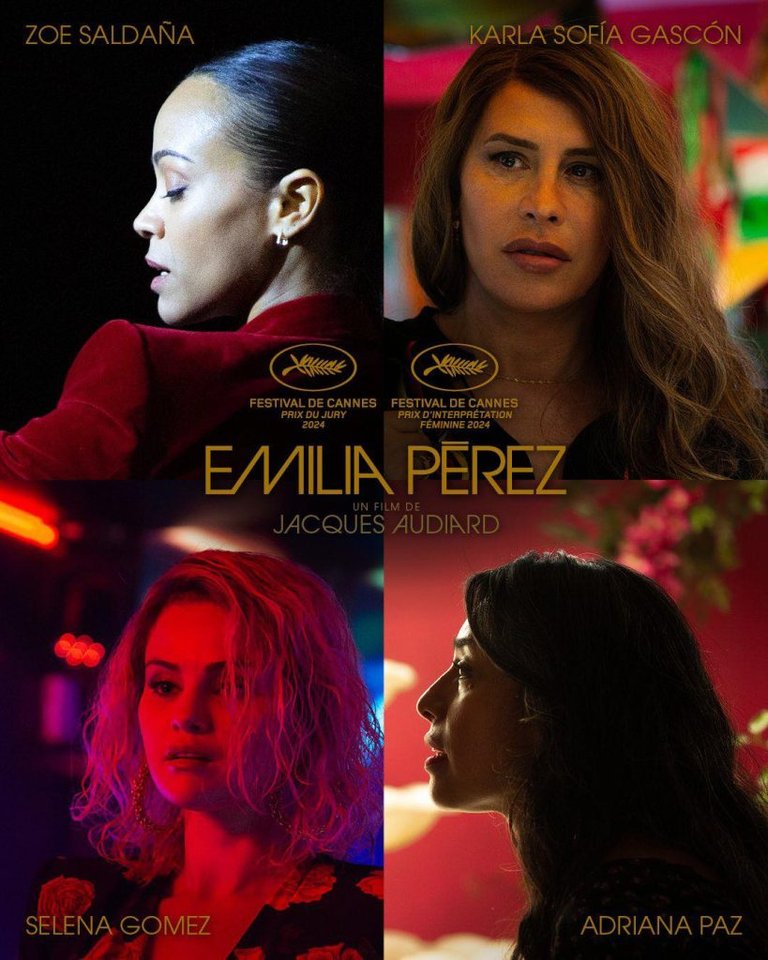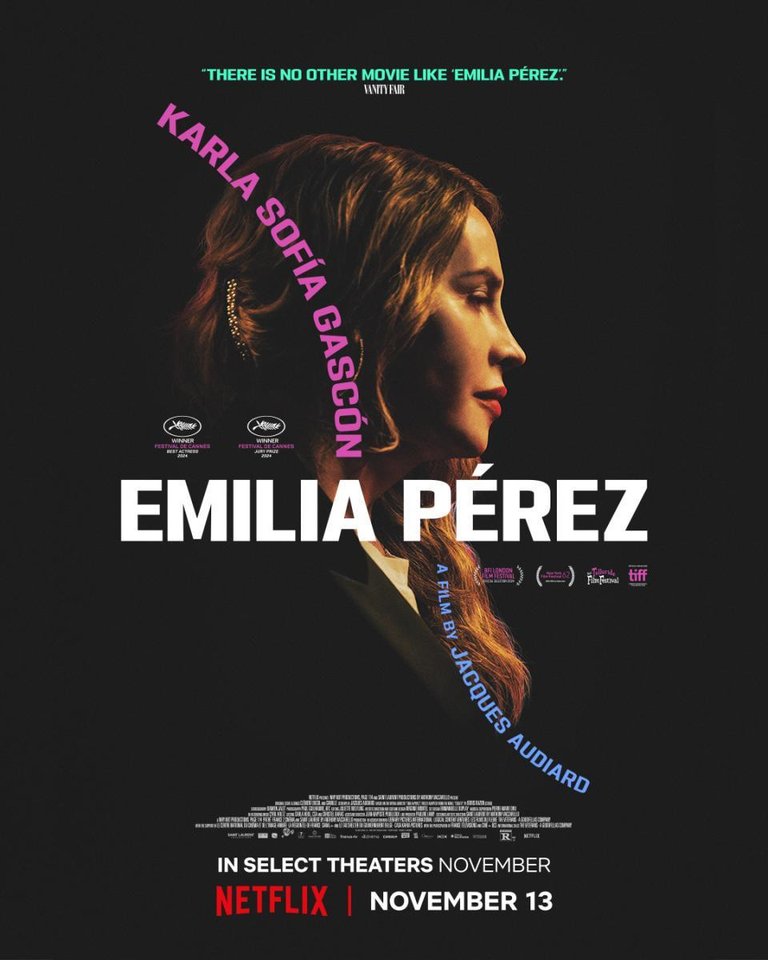Emilia Pérez (2024): embracing who we really are | aceptando quienes realmente somos

At the last Cannes festival, several films premiered that gave a lot to talk about. One of them was Anora with Mikey Madison and the other was this one, Emilia Perez, directed by Jacques Audiard of whom I had only seen the romantic drama that portrays the relationships of today's millennials, Les Olympiades (Paris, 13th District). Judging by that single reference and without having seen any preview of her latest production, I set out to see Emilia Pérez and the truth is that it surprised me. A lot.
En el último festival de Cannes se estrenaron varias películas que dieron mucho de qué hablar. Una de ellas fue Anora con Mikey Madison y la otra fue esta, Emilia Perez, dirigida por Jacques Audiard de quien solamente había visto el drama romántico que retrata las relaciones de los millenials de hoy, Les Olympiades (Paris, 13th District). Juzgando por esa única referencia y sin haber visto ningún avance de su última producción, me dispuse a ver Emilia Pérez y la verdad es que me sorpendió. Mucho.
For starters, the plot has an unusual balance between cliché and originality. It begins as a legal thriller in which Rita (Zoe Saldana), who works at a law firm, feels upset by having to defend over and over again people who are clearly guilty, but who, because they have a lot of money, manage to get away with it and evade justice. Rita wants to do something different, but her economic situation and that of her family prevents her from taking the risk - for the moment - of looking for an alternative. It's then that Rita is kidnapped by one of the most powerful and dangerous drug traffickers in Mexico, Manitas (Karla Sofía Gascón), who takes her to a secret location and in a private conversation offers her a deal. It's true that kidnapping someone to ask for a favor may seem contradictory, but Manitas asks Rita, he doesn't force her, and he also offers to pay her a lot of money. And what the lawyer has to do, simply, is find the right person to do a job. Manitas needs discretion, privacy and someone who is able to search for information stealthily; Furthermore, it is no coincidence that he offered that job to a woman, because the task has something to do with it: Manitas wants to undergo sex reassignment surgery. He has been in treatment for two years and what he wants, more than anything in the world, is to be free, leave the cartel and be able to live as the woman he has always - deep down - felt he/she is.
Para empezar, la trama tiene un balance inusual entre cliché y originalidad. Arranca como un thriller legal en el que Rita (Zoe Saldana), quien trabaja en una firma de abogados, se siente contrariada por tener que defender una y otra vez a sujetos que a todas luces son culpables, pero que, por tener mucho dinero, logran salirse con la suya y evadir la justicia. Rita quiere hacer algo diferente, pero su situación económica y la de su familia le impide arriesgarse - de momento - a buscar una alternativa. Es entonces cuando Rita es secuestrada por uno de los narcotraficantes más poderosos y peligrosos de México, Manitas (Karla Sofía Gascón), quien la lleva a una locación secreta y en una conversación privada le ofrece un trato. Es cierto que secuestrar a alguien para pedirle un favor puede parecer algo contradictorio, pero Manitas le pregunta a Rita, no la obliga, y además le ofrece pagarle bastante dinero. Y lo que la abogada tiene que hacer, simplemente, es encontrar a la persona indicada para que haga un trabajo. Manitas necesita discresión, privacidad y alguien que sea capaz de buscar información de forma sigilosa; además, no es casualidad que le haya ofrecido ese trabajo a una mujer, porque la tarea tiene algo que ver con eso: Manitas desea someterse a una cirugía de cambio de sexo. Ha estado en tratamiento durante dos años y lo que desea, más que nada en el mundo, es ser libre, dejar el cartel y poder vivir como la mujer que siempre - en el fondo - se ha sentido que es.

Let's imagine the dilemma, the character's conflict. All her life she has felt like a woman trapped in the body of a man who in turn grew up trapped in a criminal jungle. Not only did he have to act as a man all his life, but he also had to impose cruelty, force and violence as ways to survive. And now, after being the head of one of the largest and most powerful drug cartels in the country, Manitas wants to leave all that, disappear, and simply feel like a normal woman.
Imaginemos el dilema, el conflicto del personaje. Toda la vida se ha sentido una mujer atrapada en el cuerpo de un hombre que a su vez creció atrapado en una jungla delictiva. No sólo tuvo que actuar como hombre toda su vida, sino que además tuvo que imponerse la crueldad, la fuerza y la violencia, como vías para la supervivencia. Y ahora, después de ser la cabeza de uno de los carteles de droga más amplios y poderosos del país, Manitas quiere dejar todo eso, desaparecer, y simplemente sentirse como una mujer normal.
I admit that I wasn't expecting that request and that obviously I would have known about it if I had decided to see some trailer or read some of the criticism that Emilia Pérez has received. However, that was not the biggest surprise when watching the film, because as soon as it began, a few minutes of film had passed, when the viewer realized that the film was also a musical. That is, it's a dramatic film, a crime thriller, an LGBTQ+ themed film and a musical. Everything at once. I don't remember when was the last time I saw a film with this mix - perhaps never - which is made even more rare by the fact that the director is French, the characters (played by a Spanish woman, an American of Caribbean origin, a Venezuelan and another North American) are Mexican and the film is almost entirely recorded in Spanish. A fairly good Spanish - although far from seeming native - in the case of Zaldaña, rougher and more stuck in the case of Selena Gómez, better in the case of Karla Sofía Gascón, but on all levels unusual to come from a French director and be exhibited in Cannes. All of this results in an unusual mix of violence, drama, inclusion, comedy, suspense, politics, dance, songs, romance and a story that can be summarized in the acceptance of one's own being and the possibility of redemption.
Reconozco que no me esperaba esa petición y que obviamente lo habría sabido si me hubiera propuesto ver algún avance o leer algo de las críticas que ha recibido Emilia Pérez. Sin embargo, no fue esa la mayor sorpresa al ver la película, porque apenas comenzada, unos pocos minutos de cinta han transcurrido, cuando el espectador se da cuenta de que la cinta es también un musical. Es decir, es una película dramática, un thriller criminal, una película de temática LGBTQ+ y un musical. Todo a la vez. No recuerdo cuándo fue la última vez que vi una película con esta mezcla - acaso nunca - que se enrarece aún más con el hecho de que el director es francés, los personajes (interpretados por una española, una norteamericana de origen caribeño, un venezolano y otra norteamericana) son mexicanos y la película está casi enteramente grabada en español. Un español bastante bueno - aunque lejos de parecer nativo - en el caso de Zaldaña, más tosco y trabado en el caso de Selena Gómez, mejor en el caso de Karla Sofía Gascón, pero en todos los niveles inusual para provenir de un director francés y exhibirse en Cannes. De todo ello resulta una mezcla poco común de violencia, drama, inclusión, comedia, suspenso, política, bailes, canciones, romance y una historia que se puede resumir en la aceptación del ser propio y la posibilidad de una redención.

I have always thought that musicals have an extra point of demand because the actors and actresses must, in addition to acting and feeling, dance and sing. In my opinion, the simple fact of making a musical - and doing it well - is to be congratulated. And in the case of Emilia Pérez, although it is true that there are many songs and that a musical thriller is unusual, at no time do the performances falter. The entire cast is up to the challenge, especially Zoe Saldana and Karla Sofía Gascón.
Siempre he pensado que los musicales tienen un punto extra de exigencia porque los actores y las actrices deben además de actura y sentir, bailar y cantar. En mi opinión, el simple hecho de realizar un musical - y hacerlo bien - es para felicitarles. Y en el caso de Emilia Pérez, si bien es cierto que hay muchas canciones y que un thriller musical es inusual, en ningún momento las actuaciones desfallecen. Todo el reparto está a la altura del desafío, especialmente Zoe Saldaña y Karla Sofía Gascón.
I don't know how Jacques Audiard came up with this story, I don't know whose idea it was to make the film in Spanish, I don't know who proposed the musical genre, I don't know who was responsible for bringing together Karla Sofía Gascón, Selena Gómez , Zoe Saldaña, Adriana Paz and Édgar Ramírez, I don't even know who to recommend watching this film, but within so much uncertainty I feel within me the certainty of having seen a good film. Because of the risky nature of the proposal, because of the entertaining nature of the script, because of the different genres it exposes, because of the different themes present in the plot (transsexuality, drug trafficking, impunity, power, money, morality, justice, love, guilt, betrayal) Emilia Pérez turns out to be a film that keeps you attentive. I don't know if it is a coincidence that both this film and Anora - the other film applauded at Cannes - have an unusual mix of violence, romance and comedy, but everything seems to indicate that the mix of different genres and the commitment to a less purist product is a good way to engage a wider audience. And I support the idea, as long as there continue to be other directors who make quality films representative of each genre. A thriller like Anatomy of a Fall, a romance like Past Lives, a family comedy like The Holdovers, a musical like Les Miserables, a queer-oriented film like Portrait of a Lady on Fire; and among all those, some more daring and heterogeneous ideas like Emilia Pérez, have any of you seen it yet? I read you in the comments.
Yo no sé cómo se le ocurrió a Jacques Audiard esta historia, no sé de quién fue la idea de hacer la película en español, no sé quién propuso el género musical, no sé quién fue el responsable de reunir a Karla Sofía Gascón, Selena Gómez, Zoe Saldaña, Adriana Paz y Édgar Ramírez, no sé ni siquiera a quién recomendarle ver esta película, pero dentro de tanta incertidumbre siento en mí la certeza de haber visto una buena película. Por lo arriesgado de la propuesta, por lo entretenido del guión, por los distintos géneros que expone, por los diferentes temas presentes en la trama (transexualidad, narcotráfico, impunidad, poder, dinero, moral, justicia, amor, culpa, traición) Emilia Pérez resulta ser una película que te mantiene atento. No sé si es casualidad que tanto esta película como Anora - la otra película aplaudida en Cannes - tengan una mezcla poco común de violencia, romance y comedia, pero todo pareciera indicar que la mezcla de diferentes géneros y la apuesta por un producto menos purista es una buena forma de enganchar a un público más amplio. Y apoyo la idea, siempre y cuando sigan existiendo otros directores que hagan películas de calidad representativas de cada género. Un thriller como Anatomy of a Fall, un romance como Past Lives, una comedia familiar como The Holdovers, un muscial como Les Miserables, una película de mirada queer como Portrait of a Lady on Fire; y entre medio de todas esas, algunas ideas más osadas y heterogéneas como Emilia Pérez, ¿alguno de ustedes ya la ha visto? Los leo en los comentarios.
Reseñado por @cristiancaicedo
Other posts that may interest you | Otros posts que pueden interesarte:
 |
|---|




Me había hablado de esta película. Y tengo muchas ganas de verla aún cuando leo que no hay muchas variantes. Tengo que verla ja ja ja...
Qué interesante historia! Parece que Emilia Pérez es una película extremadamente rara en cuanto a historia. La mezcla de géneros como el thriller, el drama, el musical y la temática LGBTQ+ la hacen una propuesta muy arriesgada sin quitarle su intriga. Parece ser una película que no solo entretiene, sino que también hace reflexionar sobre temas complejos y actuales. Definitivamente una película a tener en cuenta para los amantes del cine que buscan algo diferente y estimulante, a mí personalmente siempre me han gustado las narrativas que rompen esquemas típicos, probablemente le de un try en algún momento. Gracias por compartir esta review